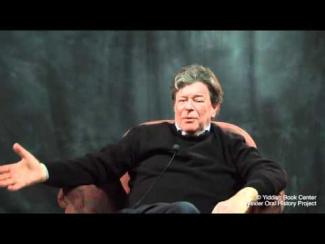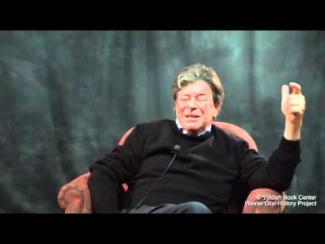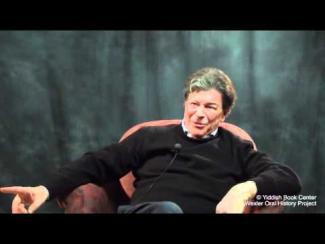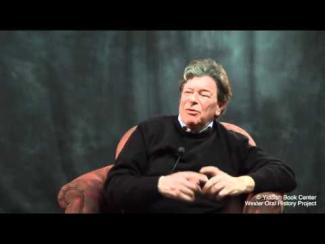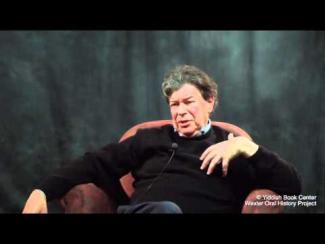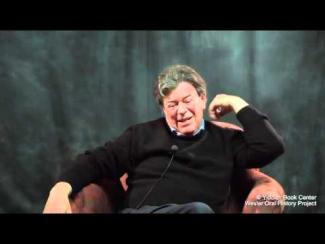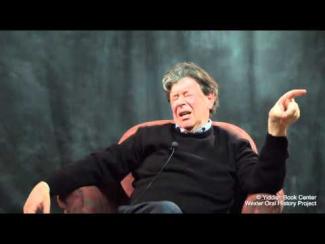The Yiddish Book Center's
Wexler Oral History Project
A growing collection of in-depth interviews with people of all ages and backgrounds, whose stories about the legacy and changing nature of Yiddish language and culture offer a rich and complex chronicle of Jewish identity.
Micha Eisenstorg's Oral History
Micha Eisenstorg, Yiddish librarian at the Jewish Museum in Belgium, was interviewed by Christa Whitney on October 25, 2010 at the Yiddish Book Center in Amherst, Massachusetts. Micha dives right into the recounting of his experience as the youngest son of parents who survived the Nazi occupation of Belgium during the Second World War by hiding. This was common in Belgium, he explains, and his brothers also hid. Micha's last name was changed by immigration officers when his parent's emigrated to Belgium. This was a problem for many immigrants, and having several names in different branches of the family made it difficult to locate family members after the second world war. Both of his parents came from Poland in the 1920s, and met in Antwerp. His mother was an orphan (due to Typhus) from Poland and his father from Lodz. He recalls how, as the only Jewish child in his school, he was left out of the tradition to visit grandparents on Thursday afternoons. This was common among his post-Shoah (Holocaust) generation. During the war, his parents escaped briefly to the South of France, but returned to Brussels. The entire family hid after the Nazi invasion. One brother hid with a Flemish family and didn't recognize his mother after the war. His parents refused to wear the yellow stars and his mother would recall how his father would break curfew to play cards with friends, but was never caught. Micha recalls when a deportation train was stopped by young underground resistance fighters on april 19, 1943, the same night of the Warsaw ghetto uprising. Because so many Belgian Jews were hidden, it became hard for Nazis to catch the Jews. Therefore, starting in Oct 1942, they kept caught people in barracks in [Mekhlin] and developed work camps for them to work for several days before they had enough people to send them off to Auschwitz. His father-in-law was caught in Jan 1943 and opened the doors of the train from inside using tools he had taken from his work in one of the slave labor camps. His aunt and father-in-law were on this train, and escaped of 250 people total. Micha grew up in the zionist youth movement Yehuda Noar Khalutsi (Yehuda Banim), but left after a kibbutz aliyah (trip to Israel) in 1961, when he decided kibbutz life was not for him because the Belgians he met there didn't greet him. He eventually joined, and then became president of, a young adult organization of people who had left the Zionist movement. He remembers organizing the first conference for Soviet Jewry in 1971 (the time of the trial of Leningrad), and another in 1976, with many honored high-level Jewish figures in attendance. In 1965, he began his service in the Belgian navy, where he was one of the only Jews on the ship. In 1975, [Serch Glazfeld], a leader in prosecuting the responsible leaders in the deportation of Jews in France during WORLD War Two, came to Belgian for a conference. After Glazfeld called for Belgian Jews to do the same, Micha was moved to get involved. On May 8, 1975 (anniversary of the end of the war) Micha with a friend and a Belgian media crew occupied the flat of [Erst Elas] in Germany near the Danish border, leader of the Nazi police in Brussels, creating a huge media stir, and eventually leading to a trial of three Nazi police involved in the Belgian deportation in 1980. [Elas] committed suicide the night before the trial. This was an important step in getting the story of the Nazi occupation in Belgium to be written. He married a woman he grew up with, but never knew. They have three children who now live in Brussels, Israel, and Paris. He joined as an honorary member (and became president in 2000) of the organization of Jewish deportees of Belgium after the 1975 experience in Germany, and was involved in survivors' education on Belgian schools. He has been involved in helping the organization of hidden children, though he declined to join as he didn't have the shared memory that they had. He recalls many survivors visiting his home growing up, and how they never asked him to leave the room. Camp and hidden children survivors often waited longer to tell their stories—he remembers seeing people at the beach with tattoos on their arms saying that they had written their phone numbers there, for fear of forgetting—and it wasn't until their grandchildren were born that many began to talk of their experiences. His wholesale leather good business closed around 2003, and became the Yiddish librarian and tour guide for the Jewish Museum in Brussels. Most of the visitors to the museum are not Jewish, though Jewish visitors often realize how much they don't know when they visit. Yiddish is disappearing today in Belgium, as in France and Israel, even as people return to study Yiddish as a culture rather than language. He recalls the Belgian weekly part of a Yiddish newspaper that is no longer, recounts how he occasionally tries to speak Yiddish with his friends, and laments how he thinks Yiddish is "finished" for the next generation, unless something extraordinary happens. He talks about the importance of giving his children a Jewish (religious) education, and passing on a sense of Jewishness, no matter what they did with it afterwards. Micha always had a strong intuitive sense of his Jewishness, without knowing exactly where it came from, and even though his brothers didn't share this sense. Today, he is the Jewish leader of the family, and his two brothers come to the Jewish holidays he organizes. One of the ways he keeps his Jewishness is to very strictly not eat even one crumb of bread during Pesakh. There have been very funny stories that came about because of this… but it is something he feels very strong about. Micha is well aware of the importance of the individuality in identity—it doesn't all depend on education. This is exemplified by the difference between himself and his brothers, and between his three children. Over his lifetime, positions of leadership found him without his seeking them out. Most recently, the orthodox community asked him to become president, but he doesn't even keep kosher, not is he shomer shabat! Similarly, he asked if he could help at his children's dayschool. One night he was selling raffle tickets and before long he was on the steering committee! Micha always has to be doing something, especially for the Jewish community.
This interview was conducted in English.
Micha Eisenstorg was born in Brussels, Belgium in 1946.

